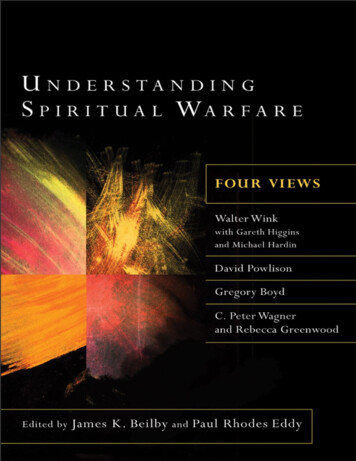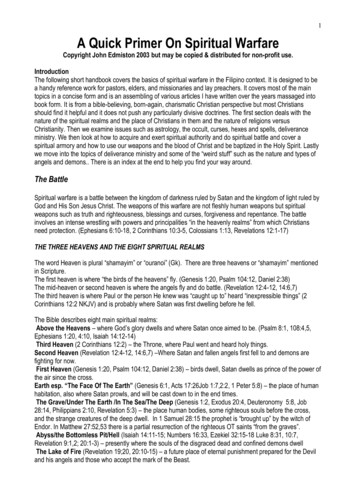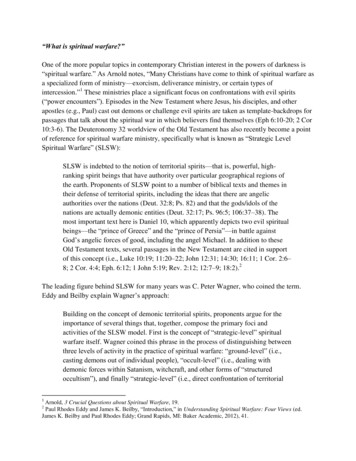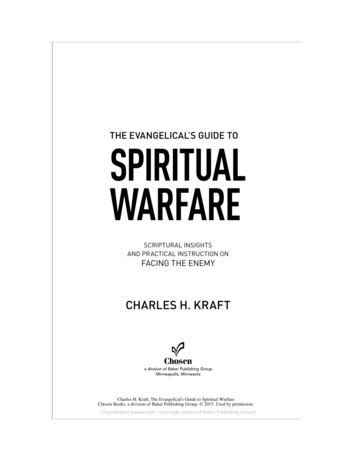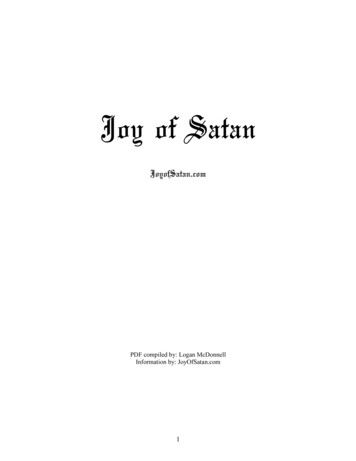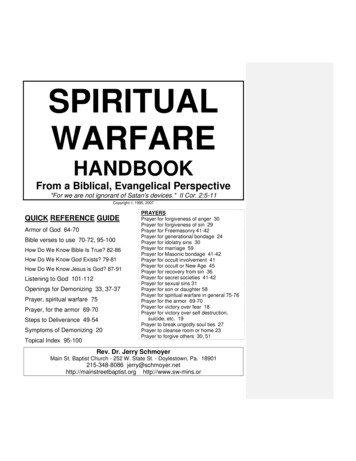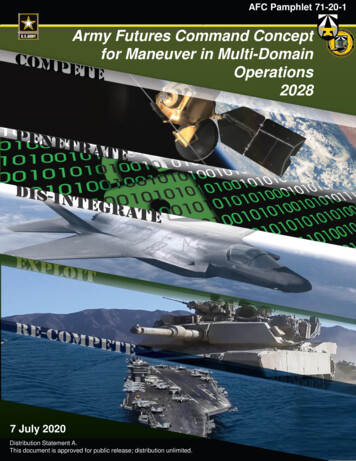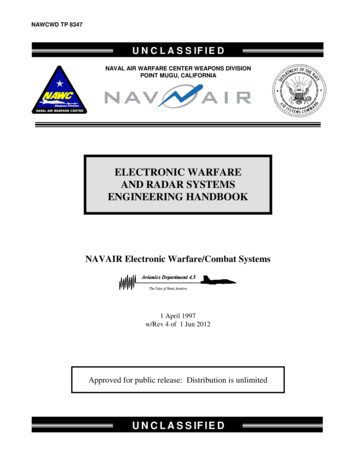
Transcription
The Warfare with SatanAND THE WAY OF VICTORYByJessie Penn-LewisOriginally published byTHE OVERCOMER LITERATURE TRUST EnglandThis work is in the public domain1
PREFACEThis book is based on a series of addresses given by Mrs. Penn-Lewis in 1897, at a day of waiting on God at theC.I.M. Hall, London. Since then a number of editions have been printed, and it has proved of value to many Christianworkers.In her original Preface, Mrs. Penn-Lewis wrote: "So little has been written on this subject from an experimentalstandpoint, that I trust the following brief treatise dealing with a vast, and to a certain extent little known subject may beof practical service at this present time to all who are meeting the forces of darkness in what is to them new power."In sending out this edition our prayer is that this book may be used to bring light, hope, and victory to many in allsections of the Christian Church.J. C. MetcalfeParkstone,Dorset,May 19732
CONTENTSCHAPTER 1 .4The Risen Lord in the midst of His people, and His call to victory.CHAPTER 2 .6The adversary and his origin; his names; his kingdom; his organized government, and his religion.CHAPTER 3 .11The adversary's subjects on the inhabited earth. How he retains his kingdom and control in theworld of men.CHAPTER 4.14How the adversary was conquered at Calvary. The proclamation of the conquest throughout hisdominions.CHAPTER 5 .18The adversary's resistance to the liberation of his captives, and how souls are freed by the powerof the Cross.CHAPTER 6 .23On the Resurrection side of the Cross. The call to arms and the armor of light.CHAPTER 7 .27The wiles of the adversary in the spiritual sphere concerning revelations, the voice of the Lord,guidance, and liberty.CHAPTER 8 .33The Overcomer on the throne of victory; Satan under the feet of the believer.All references in this book are taken from the Revised Version of the Bible, and the letters "C.H." indicate Conybeareand Howson's translation of the Epistles of St. Paul.CHAPTER 13
The Risen Lord in the midst of His people, and His call to victoryThe Apostle John had been banished to Patmos "for the word of God and the testimony to Jesus." It seemed thathis work for the Master was ended! But in the plan of the Omnipotent Lord it turned out to be greater and wider servicethan he had ever dreamed of, and more far-reaching in its effects than any previous part of his life. On the lonely isle,cut off from all intercourse with other children of God, the Lord appeared to him as the Glorified One enthroned on theright hand of the Majesty on high, choosing him to be the channel for transmitting to His people a direct revelation ofHis heart and will concerning them. He gave him a wondrous unveiling of the history, and destiny of the Church of theredeemed, with the concluding scenes which should wind up the dealings of God with the earth-planet, and usher inthe glorious reign of the Son of God upon the earth.It is written that the Apocalypse is the Revelation of Jesus Christ, which God gave unto Him, to show unto Hisservants the things which must shortly come to pass (ch. 1:1,m.). But He must find a human channel to convey it toHis people. So it was for this purpose that the King of kings permitted the devil to arouse the persecution whichtransferred His chosen vessel to the lonely isle, where, away from the claims of active service, he would be free toreceive the message from on high. Untoward circumstances can only come to the redeemed of the Lord so far as theyare necessary for the fulfilment of His plans.The Apostle is "in the Spirit on the Lord's day," and suddenly hears a great voice saying, "What thou seest, write ina book, and send it to the seven Churches." He turns to see who it is that speaks to him, and there breaks upon hisspiritual vision a wondrous revelation of Him whom he had known on earth as the Man Christ Jesus; the very One hehad seen hanging upon a cross of shame, despised and rejected of men; the One he had talked with after Hisresurrection; the very same Jesus he had seen pass into the clouds of heaven.John sees Him "in the midst of the lampstands," which are explained later on to be the seven Churches (chapter1:20, m.). He is seen to be walking in the midst; walking as He walked in the temple at Jerusalem, first a silentonlooker, and then a cleanser of all that defiled His Father's House, for it was written of Him, "The zeal of Thine houseshall eat me up."1The Glorified Lord was clothed in garments denoting His High Priesthood within the veil, whither He went as aforerunner for us, having become a High Priest forever after the order of Melchisedeck, and where He ever liveth tomake intercession for all who draw nigh to God through Him. The golden girdle He wears denotes the investiture ofhighest rank and power. His head and hair are white as white wool, signifying purity rather than age. It is remarkablethat the same characteristic of hair like pure wool was seen by Daniel when he had the vision of the One Who sat upona throne of fiery flames, when the judgment was set, and the books were opened. 2 "Glorify Thou Me with Thine ownself with the glory which I had with Thee before the world was," prayed the God-man on the eve of His Cross andPassion. The Father and the Son are One. The Ancient of Days, and the Christ Who appeared to John, with head andhair as white as wool, are One—blessed for evermore.The Apostle says that "His eyes were as a flame of fire," all-searching and consuming, and "His feet like untoburnished brass as if it had been refined in a furnace." Fire is His very essence of being; fire of love toward perishingsinners; fire of wrath upon sin; fire which consumes, and melts and burns all that is not of its own nature so as totransform all it touches into its own element. The Man on the Throne had as it were "the appearance of fire," 3 whenEzekiel saw Him, and the Man Who appeared to Daniel had eyes as "lamps of fire." 4 Yes, our God is a consuming fire."His voice as the voice of many waters," is always sweet to His Bride, but terrible to those who do not know Him."Out of His mouth proceeded a sharp two-edged sword," for His mouth gives forth words "living, and active, andsharper than any two-edged sword," and "piercing even to the dividing of soul and spirit, of both joints and marrow, andquick to discern the thoughts and intents of the heart." 5 Yes, His word acts as a sacrificial knife in all who yield to Him,and are laid upon the altar of His Cross in fellowship with Him—there to be consumed by the heavenly fire—a wholeburnt-offering to God.But what words could describe His face? John says, "His countenance was as the sun shineth in his strength."Who can gaze into the face of the sun which was created by Him, and who can look with undimmed vision into His faceas it is now in the glory? The face which was once more marred than any man's, so marred that when it is revealed toseeking souls as that of "God manifest in the flesh," He startles nations. 61234561 John 2:17Dan Daniel 10:6iel 7:9, 10Ezekiel 1:27Daniel 10:6Hebrews 4:12Isaiah 53:14, 15, margin.4
The Apostle saw the Son of Man, His clothing, His girdle, His hair, His eyes, His feet, and heard the voice thatspoke to him like a trumpet, or the sound of many waters, but when his eyes were raised, and he looked full in Hisface, and saw Him, then he fell at His feet as one dead.If the Apostle who knew Him on earth so well that he leaned upon His bosom in intimate fellowship and love, thusfell before Him at the sight of His heavenly glory, what shall it be for those who reject Him now? Even kings of theearth, and princes, shall cry, "Hide us from the face of Him that sitteth on the throne, and from the wrath of the Lamb."But to the Apostle it was the very same Jesus that he had known on earth. He had not changed. The glory of thatlight which was always in Him, as shown on the Mount when He was transfigured before them, and His face did shineas the sun, now shone out unveiled by the body of His humanity. He is still Man—the Son of Man —in the glory, as Hequickly showed when He saw His loved Apostle lying prostrate at His feet.How often the touch of His hand on earth had healed, and blessed. How sweetly His voice had said again, andagain, "Fear not—It is I, be not afraid," and once more the familiar words "Fear not" break on the ear of the prostrateman. He lies "as one dead," unable to help himself. Daniel also so lay, when, at the sight of the Lord of glory witheyes as lamps of fire, his earth-born comeliness was turned into corruption, and he fell into a deep sleep on his facetoward the ground, until a hand touched him, and strengthened him to hear the divine words. The same hand, but nowa hand which John had seen pierced, and nailed to the Cross, is laid upon the Apostle on Patmos, and the familiarvoice speaks the old calming words, "Fear not." "Fear not; I am the First and the Last." The beginning of all things,and the end of all the purposes of God. Changeless from all eternity. Manifest in the flesh. Received up into glory. IamTHE LIVING ONE"I became dead, and behold, I am alive unto the ages of the ages." "Fear not, John, remember Calvary. Thousawest Me there. Thou didst behold My Cross and Passion. Thou didst gaze upon the marred face, and the smittenform. Thou didst see the hour and power of darkness working through the creatures of My hands. Thou didst see Mein My resurrection body, and hold converse with Me after My rising from the dead, but now, behold Me as I am in theglory which I had with the Father before the world was, and know that I who became dead for thy sake am now alive forevermore, and have the keys of death and the grave. Through death I have brought to nought him who had the powerof death. O death where is thy victory? O death where is thy sting?"Why did the Lord of glory thus appear to John? He Who had sent the Holy Spirit to lead His redeemed ones into allthe truth, now sends to them the call from heaven to overcome!No message is sent to the unbelieving world, for God had already spoken by His Son, and given the fullmanifestation of His love to sinners in His death on Calvary. But an after-message comes from the glorified Lord inheaven to His own people. He had watched them in all their various circumstances, and noted their trials andtemptations. He had walked in their midst, and seen the Holy Spirit grieved and oft-times quenched, the still smallvoice unheeded, the warning touch unnoticed, the restraining providence unknown. He had observed the activeservice, and the decline of deep personal love to Him; He had noted with tenderness the tribulation and poverty ofsome; the dwelling even "where Satan's throne is" of others. He Who had conquered Satan at Calvary had watchedthe "deep things of Satan" being taught His servants; others with a name to live yet dead before Him, and otherslukewarm and self-satisfied. Yes, He had watched it all, and once more spoke from heaven to awaken His people, andbid them overcome. His chosen vessel is drawn aside to wait before Him. The cloud which received Him out of sightonce more opens, the veil is drawn aside, and the Lord of glory appears."What thou seest, write in a book, and send it to the seven churches" is the command. Tell them the "things whichthou sawest"—I am walking in their midst with eyes of fire; tell them "the things which are"—I am the Risen Lord, HighPriest of My people, and I know their ways; and "the things which shall come to pass hereafter" when if they overcomethey shall reign with Me, and "sit down with Me in My Throne, as I also overcame and sat down with My Father in HisThrone."7May the Lord's sevenfold command reach every reader —"He that hath an ear—the ear of the new creation formedwithin—let him hear what the Spirit saith to the Churches."7Revelation 3:215
CHAPTER 2The adversary and his origin; his names; his kingdom; his organized government, and his religion.Before we can understand the meaning of the urgent call to overcome, sent to His people by the Risen Lord throughHis Apostle John, it is necessary that we should see something of the prince of darkness and his kingdom.Our first question must be—who is the prince of darkness and where did he come from? The Scriptures give butveiled glimpses of his origin and home. Their purpose is more expressly to reveal God and His Christ as theRedeemer of men, the history of the redeemed from the fall of Adam in Eden, their way of salvation through the Cross,and their eternal destiny, when the Christ shall have "abolished all rule and all authority and power" 8 contrary to thereign of God, and God Himself shall be All in All.It is generally understood that the prophet Isaiah referred primarily to the adversary of God and man, when he said"How art thou fallen from heaven, O day star, son of the morning ! . . . thou saidst in thine heart . I will exalt my throneabove the stars of God . I will be like the Most High. Yet thou shalt be brought down to hell, to the uttermost parts ofthe pit."9 "We can never quite understand how it could be that among the angels there should come the thought ofself. There was one into whom pride entered. He saw the wonderful glory of God in him, and began to exalt himself.He gathered others around him, and whither did this lead? It changed these angels into devils of hell. It made the fieryflames of heaven into flames of hell—the same flame, but separate from God."10The Lord Jesus speaking of the devil to the Jews said that he "abode not in the truth"11 implying that at someprevious time he had been of different character. "He was a murderer from the beginning"12 said the Lord, the word"beginning" being the same word used in John 1:1, and the apostle again repeats the expression later saying, "Thedevil sinneth from the beginning.”13 There was a moment, then, when Satan left the "truth," and sin was found in him.There are many who think that the lament of the Lord God over the fall of a being "full of wisdom and perfect inbeauty," an "anointed cherub," dwelling upon "the holy mountain of God," and walking "up and down in the midst of thestones of fire"14 refers to the fallen angel—but whether or not this is so, sufficient is said to show that back in the pastages a terrible catastrophe occurred among the angels of God, because one glorious being admitted into his heart thethought of self, and said "I"! "I will ascend"—"I will exalt my throne"—"I will be like the Most High," and when he fellother angels fell with him, some of whom were left at large with him, but others who "kept not their own principality"but "left their proper habitation"15 were cast "down to hell, and committed to pits of darkness, to be reserved untojudgment.”16It seems clear therefore that the prince of darkness is one who was once a beautiful archangel of the highest rank inheaven, but fell from the truth and became the very embodiment of a lie. "There is no truth in him . he is a liar, andthe father of it" said the Lord, and the various names by which he is described in the Scriptures reveal still more of hisposition and character. Fallen though he be, he is called by the Lord Jesus no less than three times by the title of"prince of this world,"17 thus plainly recognizing his authority, and his official position of rule over the earth. That he is ahigh personage of rank and power we learn from Jude, for he wrote that "Michael the archangel, when contending withthe devil he disputed about the body of Moses, durst not bring against him a railing judgment, but said ‘The Lordrebuke thee.' "18 He is also called the "god of this age" 19 for men obey and worship him, even unconsciously, whenthey do not obey and worship the Creator.The fallen archangel is moreover described as the "prince of the power of the air," 20 more literally "the prince of theaerial host," meaning wicked spiritual powers dwelling in the aerial heavens, for the "satanic confederation has its seatin the atmospheric heaven—in the spaces above and around our world."21 It is significant too that the word used todescribe this kingdom in the air, means thick and misty in contrast to bright and clear air! 22 That the "prince of the89101112131415161718192021221 Corinthians 15:24Isaiah 14:12, 13, 14, 15 (See also Isaiah 24:21 and 34:4.)Rev. Andrew MurrayJohn 8:44, A. V.John 8:44, A. V.1 John 3:8See Ezekiel 28:11-17Jude 62 Peter 2:4John 12:31; 14:30; 16:11Jude 92 Corinthians 4:4, marginEphesians 2:2SeissPember6
power of the air" has authority to wield the forces of the air we see in the history of Job, for at his bidding lightning fellfrom heaven to consume the flocks of the faithful servant of God. It is significant also that when the Lord Jesus arosefrom His sleep in the storm on the lake He rebuked the winds and the sea—surely "the malignant spirits of air andwater which had combined to excite the storm."23 In relation to his attacks upon the children of men the prince of thisworld is called the "tempter,"24 because it is his fiendish delight to tempt others from loyal obedience to God, as heonce fell away himself! He is named "the devil"25—a word never used in the plural and always and only of Satanhimself. "The Hebrew name Satan occurs in the New Testament thirty-five times interchangeably with the GreekDiabolos, which is also used thirty-five times. The word Diabolos signifies separator and slanderer," 26 or "malignantaccuser." Satan is the great separator, and he separates by slandering. He slanders God to man, and carries to Godslanderous statements about His children, even as he charged Job with self-interest. He separated the race of menfrom God in Eden, and ever since he has been separating men from each other, with hatred, malice, envy andjealousy, therefore when the veil is drawn aside from the unseen world, in the Apocalypse he is specially named as the"accuser of the brethren,"27 who is cast down by Michael and his angels from his place in the air, and overcome by theredeemed on earth as they testify to the "blood of the Lamb,"28 and yield their lives to the death of the Cross.In the same unveiling of the conflict in the unseen realm around this planet we find him also described as "The greatdragon," the "old serpent"—probably from the form he took in Eden—and the "deceiver of the whole inhabited earth."That the adversary still has the kingdom of the world under his rule, is unmistakably shewn in his attack upon theLord Jesus in the wilderness temptation. The Lord was led under the constraint of the Holy Spirit into the wilderness tobe "tempted of the devil," and after other temptations, we read that the devil shewed Him "all the kingdoms of theinhabited earth in a moment of time. And the devil said unto Him, to Thee will I give all this authority, and the glory ofthem: for it hath been delivered unto me; and to whomsoever I will I give it. If Thou therefore wilt worship before me, itshall all be Thine."29"Worship before me"! What a daring condition to put to the Son of God. The fallen archangel is craving for worshipstill, for did he not say before his fall, "I will be like the Most High"?The extent of His claim to "all the kingdoms of the inhabited earth" the Son of God did not deny, and later the Lordplainly speaks of Satan's kingdom in the fallen race of men. When some charged Him with casting out demons "by theprince of the demons," the Lord said, "If Satan is divided against himself, how shall his kingdom stand?”30 And Headds that "the strong man fully armed guardeth his own court," until "a Stronger than he" comes upon him, and sets hiscaptive free. "Deliver us from the evil one"31 the Lord taught His disciples to pray, and in His High-Priestly prayer onthe eve of His Cross He prayed for them that they might be kept "from the evil one"32 for none knew more than He theextent of his power, and his malignant hatred of all who escape his rule.The words of the Apostle John also emphasize the universality of the rule of the prince of this world, for he writes"the whole world lieth in the evil one"33—it is sunk in the darkness which is his sphere, and is under the rule of the"world-rulers of this darkness."34 The word of God speaks with no uncertain sound in this vital matter, but howunwilling men are to believe the truth. The Scripture makes no distinction between high and low, or between culturedand ignorant, when it states that the "whole world"—heathen and Christendom—lies "in" the realm of the evil one.In Africa, China, India, and all other heathen lands, the one whose spiritual senses have been awakened is keenlyconscious of the sovereignty of the prince of darkness, for there the deceiver of the whole inhabited earth is daring inhis tyranny, holding men and women in gross and open sin. In civilized countries, where the people are moreChristianized, or are to a certain extent familiar with the Scriptures, the god of this age needs must veil his working, buthis rule is just as real. In these last days, however, he is beginning more openly to manifest himself as the prince ofthe world. He covets to be recognized, and to usurp the place of God in the world. Slowly he is familiarizing peoplewith his name. Palmistry, clairvoyance, planchette, and other means of intercourse with the spirits of evil, areabounding and increasing on every hand. In fact, by every possible means the enemy of God is seeking outwardrecognition as the prince of this world, with all men subject to his power.232425262728293031323334Pember1 Thessalonians 3:51 Timothy 3, 6, 7BlackstoneRevelation 12:10, marginRevelation 12:11Luke 4:5, 6, 7, marginLuke 11:18Matthew 6:13John 17:151 John 5:19Ephesians 6:127
The adversary has not only his kingdom, but he has also his organized government, which the Apostle Pauldescribes as "Principalities . . . Powers . . . Sovereigns of this present darkness,"35 and glimpses of the hierarchy of evilare clearly given in many parts of sacred writ. We read of "Satan's throne,"36 where "Satan dwelleth."37 Of "hisministers";38 of his "principalities" and his "powers," and of his hosts of "spirits of evil”39 in the heavens. Daniel'saccount of his interview with the messenger from God also reveals that these principalities and powers of Satan aregiven charge of specified countries, for the satanic "Prince of Persia" withstood the heavenly messenger, who said thaton his return he would again have to meet with the same Prince, together with the "Prince of Greece." 40Satan therefore reigns over an aerial kingdom of hierarchies and spiritual powers, and a kingdom on earth in theworld of men, and he governs by means of an organized government. "Principalities" who rule over various lands;"Powers" who are placed by him in positions of authority—angels of the devil,41 consisting of those who chose to followhim into sin when he rebelled against God; and the demons, who are thought by the vast majority of early Christianwriters to be the spirits of the dead who bore a bad character in this life, and who now crave some relief from theirrestless existence by entering the bodies of men. We read that they even preferred to enter the bodies of swine, ratherthan be cast out into homeless wandering again, or into the place they manifestly dreaded, called the abyss. 42 Theyare at any rate plainly described as wicked spirits who are under the complete command of Beelzebub their prince.As we read, however, let us not forget that all these hosts of evil are compelled to acknowledge the Sovereign Lordof the Universe! Unbelievers in God are alone to be found on earth, for although the powers of evil deceive men, andkeep them in darkness and unbelief, they themselves "believe and shudder," 43 knowing that they are reserved untojudgment in the day of the Lord.In his organized government the adversary has also a religion for those whom he can delude and deceive, and hehas methods of cultivating communion with himself, showing his perfect mimicry of the worship of the true God and HisSon Jesus Christ.In Paul's first letter to the Corinthians one aspect of Satan's religion is revealed as we are shown what idol-worshipactually means. The Apostle explains that in itself, as wood, or stone, or metal, an idol is "nothing in the world," but hemakes it unmistakably clear that the demon at the back of the wood and stone is an awful reality. He points out thatsacrifices offered to idols are really "sacrifices to demons" therefore they who would walk in fellowship with God must"flee from idolatry," lest they would hold "communion with demons." They dare not take the "cup of the Lord" and the"cup of demons"; partake of the "table of the Lord" and of the "table of demons." 44 This matter was vital to theCorinthians, as it now is to Christians in heathen lands, for often the meat offered for sale in the market-place was meatwhich had first been offered to idols, and some of the Corinthian Christians had accepted invitations to feastscelebrated in the temple of heathen gods—feasts which were acts of idolatrous worship. But the Apostle knew that thespirit-forces behind the outward idol-worship were very real, and so he urges that not in the remotest way must thechild of God have contact with the powers of darkness through these things, even to please their friends, or because tothem the idol itself was nothing in the world.We see how deeply the fallen archangel has revolted from his allegiance to the Most High God, for he not onlydeceives, and tempts, and holds in darkness the human race, but he adds to their destruction and deepens his holdupon souls, by seeking to meet the desire for an object of worship which lies dormant in every breast, for man wascreated for God, and even in his fallen condition retains the consciousness of a higher power, and the instinct toworship and adore.Apart from direct satanic worship as manifested among the heathen in their bowing down to idols, Satan has otherways of meeting the need for some religion which is part of the instinct of men. The Apostle Paul writes to the Romans"Thou that abhorrest idols, dost thou commit sacrilege?"45 as he shows that no outward rite or ceremonial fulfilment ofthe law is acceptable to God apart from the putting away of sin, and the seeking of God in spirit and in truth. 46 Satanknows this, and therefore persuades men that outward obedience to some creed is enough, thus deluding multitudesinto a false peace by causing them to rest upon an outward form of words or ceremony, while inwardly he keeps themunder the darkness of his rule.353637383940414243444546Ephesians 6:12, C. H.Revelation 2:13Revelation 2:132 Corinthians 11:15Ephesians 6:12, C. H.Daniel 10:13, 20See Matthew 25:41Luke 8:31, 33James 2:191 Corinthians 10:19-22, C.H.Romans 2:22, marginRomans 2:28, 298
In the Lord's message to the church at Smyrna He spoke of those who "say they are Jews, and they are not, but area synagogue of Satan."47 It appears by this that the adversary has not only a religion which gives him worship throughmaterial images, but that his "synagogue"—or congregation—is made up of professors of religion who are without theinward truth. The Apostle John uses plain language concerning this when he writes, "If we say that we have fellowshipwith Him, and walk in darkness (i.e. in sin), we lie, and do not the truth," 48 and the most severe words that ever passedthe lips of the Lord Christ when on earth, were His scathing exposures of the Pharisees. "They say and do not" Hesaid, and "outwardly appear righteous unto men," when inwardly full of hypocrisy. He told them their actual condition,saying that they were of their "father the devil," and He called them "serpents," and the "offspring of vipers," saying thatevery proselyte they gained was made more a "son of hell" 49 than themselves! And yet the Pharisees claimed God astheir Father, and were of the straightest sect in Israel in the outward fulfilling of the law! The Lord's strong wordsagainst the professors of "godliness without the power thereof"—the Divine energy which saves from sin—makes ittherefore appear that Satan's invisible "church" is filled—not with the openly sinful, nor the purely ignorant, but—withthose who make religion a cloak while they are really subjects of Satan, obeying his will, and serving him all the time,as "all their works they do for to be seen of men."The worship of idols, and the hypocritical profession of godliness without the inward reality, are not the only aspectsof Satan's religion, for in both of these men are often unconscious of their condition, and would be startled if they knewthe truth. The arch-enemy desires to have greater possession of human beings than this, and craves the openrecognition of his power and authority, with the deliberate surrender to him of the will. To obtain this, the Apostle says,he can fashion himself as an "angel of light" 50 to allure those he desires to win for his particular use. Probably thefallen archangel has not lost the form of wondrous beauty in which he was created, only that the light of God has goneout of him, and darkness fills his whole being, but this he can veil when occasion demands, and he desires tocounterfeit the angels of God. His reward is great to all who will openly acknowledge him, and he has his "deep things"to reveal to those who will fully yield to him.The Lord refers to these "deep things of Satan" 51 in His message to the church at Thyatira, and the Apostle Paulwrote to Timothy that the Holy Spirit had expressly told him that in the latter days the adversary would seek to drawmany away from faith in Christ by the teaching of spirits inculcating "doctrines of demons."52 So that Satan has"doctrines" as well as a system of worship—a "cup," a "table," and a "synagogue!" The character of the instrumentusable by the spirits should be noted, for Paul said that the teaching would be given through men who would profess tobe what they were not, and whose conscie
The wiles of the adversary in the spiritual sphere concerning revelations, the voice of the Lord, guidance, and liberty. CHAPTER 8 . 33 The Overcomer on the throne of victory; Satan under the feet of the believer. All references in this book are taken from the Revised Version of the
